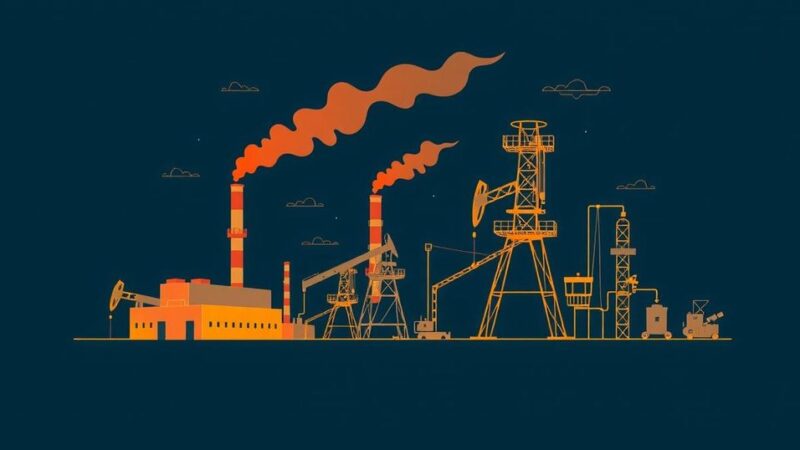JBS seeks public funding to combat climate change despite being a major greenhouse gas emitter. CEO Gilberto Tomazoni argues for increased investment in agriculture, citing its potential for carbon capture, while critics emphasize the industry’s significant contribution to emissions and deforestation. Recent reports show rising greenhouse gas emissions from agriculture, raising questions about the sustainability of current agribusiness practices.
JBS, the world’s largest meat producer, reported a significant net revenue of $3.1 billion in the second quarter of 2024 and is now seeking public funding to address climate change. CEO Gilberto Tomazoni highlighted in September that a mere four percent of current climate investment flows into agriculture and food systems, urging the sector’s potential for carbon capture and advocating for an estimated $300 billion to $350 billion for such transformation. Despite JBS’s push to position the meat industry as a critical ally in combating climate change, this comes against the backdrop of Brazil’s meat sector being a major contributor to greenhouse gas emissions. Research indicates that livestock contributes 28 percent of Brazil’s greenhouse gas output due to methane emissions from cattle and deforestation linked to ranching. Tomazoni’s appeal for increased agribusiness investment represents a broader agenda among agricultural leaders, aiming to reshape perceptions within international forums such as the G20. These companies have expressed interest in leveraging a recent IMF-World Bank commitment to increase funding for “climate-smart” agriculture to $9 billion annually by 2030. However, critics argue these companies focus on production increases while neglecting necessary reductions in meat consumption, thus overshadowing honest dialogue about sustainable practices. The food industry often claims to address hunger and malnutrition issues in the Global South; however, the UN Committee on World Food Security underscores that these issues stem primarily from power disparities, access, and distribution challenges, rather than mere food shortages. Leaders from agribusiness, including Tomazoni, participated in the B20 Food Systems and Sustainable Agriculture Task Force, attempting to influence G20 discussions directly. Their efforts bore fruit as many recommendations were adopted, reflecting strong alignment with the agribusiness sector’s interests. The task force’s influence is evident in the G20 Agriculture Working Group’s declarations, which echoes calls for fair trading systems benefitting global markets, especially amidst rising protectionism criticisms, notably regarding the EU’s Deforestation-Free Products Regulation. Experts, however, have criticized the meat sector’s request for investments, labeling it unrealistic. Carlos Bocuhy from the Brazilian Institute for Environmental Protection stated that the livestock sector should be responsible for its mitigation efforts, emphasizing the need to support agroecological practices instead. Recent studies also revealed an alarming trend in Brazilian agriculture, with greenhouse gas emissions reaching record highs for the fourth consecutive year, primarily driven by cattle herd expansion. The report indicated that cattle are responsible for 64 percent of emissions within the agricultural sector, prompting discussions on потенциаль herd size reductions or alternative strategies like early cattle slaughter to manage emissions effectively. Accompanying these emissions challenges, livestock production remains a leading cause of deforestation in the Amazon, with recent findings showing it accounted for 77 percent of deforested land from 1985 to 2022. Addressing these interconnected issues will prove essential for meaningful climate action.
The current discourse surrounding JBS’s efforts to obtain public funding for climate initiatives reflects longstanding concerns about the meat industry’s environmental impact. The company’s role as a significant contributor to Brazilian greenhouse gas emissions stems from its operations, which yield methane emissions from livestock and extensive deforestation for cattle ranching. JBS’s campaign for climate investment aims to pivot these narratives, seeking to showcase agribusiness as a viable contributor to sustainable solutions, despite scientific evidence suggesting otherwise.
In conclusion, JBS’s ongoing efforts to secure public funding for climate change mitigation arise in a contentious context. While the meat industry is being promoted as an essential participant in sustainable food systems, scientific consensus highlights significant contradictions in its claims regarding carbon capture and hunger alleviation. The increase in greenhouse gas emissions associated with livestock production underscores the urgent need for genuine investments in sustainable agricultural practices, rather than perpetuating reliance on agribusinesses that contribute heavily to climate challenges.
Original Source: www.desmog.com






